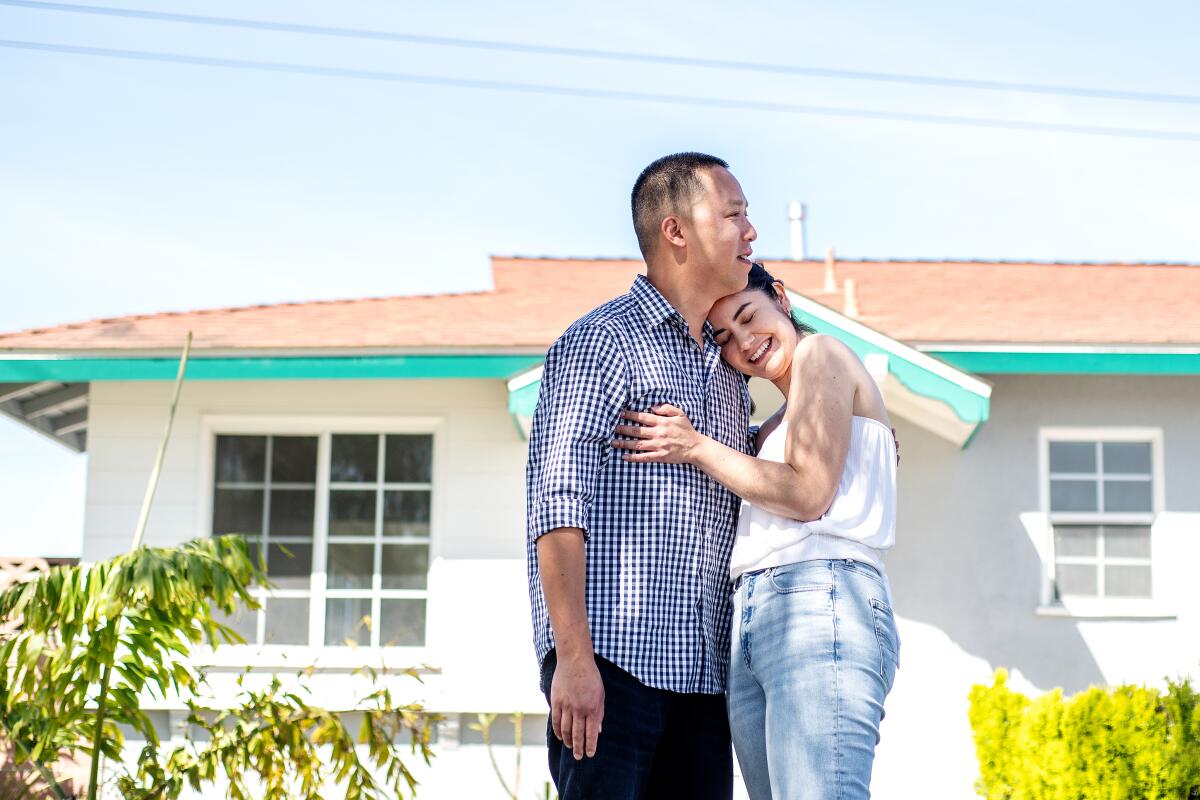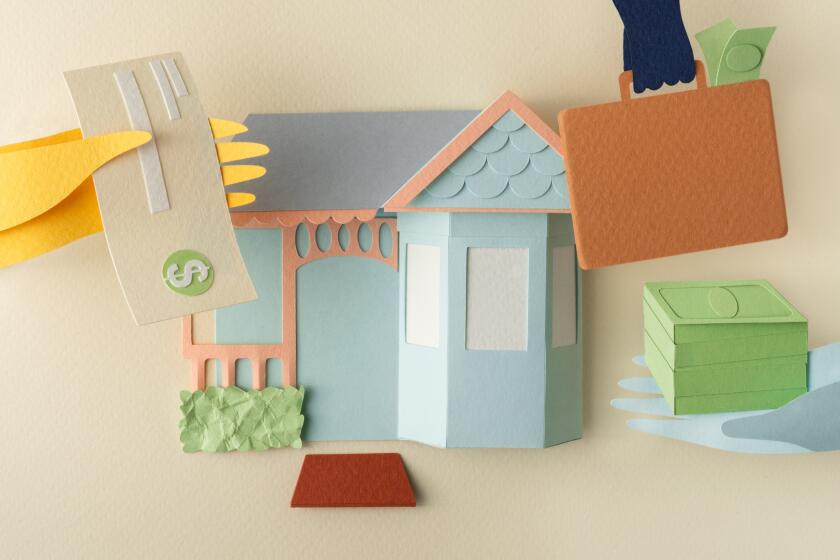She grew up in a rental down the street from her dream home. Now, that house is hers

- Share via
Growing up, Sarah Tran used to walk by the 1,200-square-foot house near the family’s apartment, peer in at the pool and wish she could jump in. A few months ago, she and her husband bought that house.
“We did this on our own. We’re not trust-fund babies,” Tran, 31, said. “It was a whole journey to get this home.”
Buying a house in California has become increasingly hard. The pandemic pushed the market into overdrive as people scrambled for more space. About a quarter of all Southern California home sales are to investors — landlords, big companies such as Opendoor, and flippers — according to data from John Burns Real Estate Consulting, meaning the average person looking to buy is competing with those players too.
At the end of last year, the homeownership rate across Los Angeles and Orange counties was 48%, compared with 66% nationally.
The Times set out to simplify and explain what’s required to buy a home for the first time in this region: how to figure out budget and financing, look for homes efficiently and make a solid offer in a sea of rival bidders. But what it really takes to secure a house is very personal, and each journey takes its own twists and turns.
We asked Times readers to take us inside their process for a closer look.
Tran and her husband, John, 30, started looking to buy a place last year to make space to grow their family. They had been renting a house in the San Gabriel Valley and were hoping to land somewhere between there and the Long Beach area, where her parents live.
Tran, a retail buyer, and her husband, an IT supervisor, each earn six-figure incomes. They calculated their bank account savings and 401(k)s and focused their search, initially, on condos. What felt out of reach to them at the outset on closer consideration seemed very workable.
Tran was counting on a major bonus from a new job she had that required her to move to Nashville — another advantage that helped her save. The couple started looking at condos in L.A. County remotely and went into escrow twice on two different ones. Both fell through. Tran left the Nashville job and came back to Southern California.
Late last year, they switched their gaze from condos to single-family homes after diving into their finances and nailing down what they could afford.
“I’d always see this house walking by,” Tran said of the three-bedroom, two-bath home she zeroed in on, down the street from her parents’ home. The couple bought it in December for $680,000 (the list price was $625,000) and have spent $40,000 on renovations.
“We’re excited to just build generational wealth so that our children ... have an easier path than we did,” she said. “I feel very grateful to be a homeowner.”
The following account from Tran, based on interviews with her, has been edited for clarity.
Starting out
In October, I told my husband we need to start looking — prices are only going to continue to go up as we head to the end of the year and into 2022. And we saw some condos in the Whittier area, but there was one condo [in a location that didn’t feel totally safe at night and] my husband was fed up with condos after that. And he was like, “You know what? Let’s start looking for homes. Let’s look at our budget, and let’s see what we can afford.”
Before starting your home buying search, experts say you should figure out much you can borrow — and whether a smaller mortgage would be wiser.
We had been saving for about eight years. This last year we focused on cutting spending, cutting costs. And moving for my new job, that’s where I made my money.
I got a huge bonus with my previous company. We wanted to use less than 30% of our overall net income that would go to the mortgage and mortgage bills, and everything else would go into savings, groceries, vet bills because we have two dogs, clothing, entertainment and anything else.
So after looking at our numbers and looking at what we make after taxes, we figured out that we could afford a home. Condos are great, but if we can afford a home, let’s pull the trigger with the home.
Getting a mortgage
We didn’t really work with the lender. I kind of wish we would have because everything was done through the agent, and I think he was going back and forth to the lender. So we had no contact with the lender whatsoever. I wish we would have shopped around for mortgages. I think we got a pretty good rate. But I feel like we could have done our due diligence of shopping around versus just going with this Realtor.
We ended up getting a conventional loan, and our interest rate was 3%. Our agent didn’t really go over that and didn’t really go over the benefits of conventional. It was something we were approved for right off the bat.
We were approved for $700,000. It didn’t take long, less than two days. We realized, OK, well, we have actually a pretty good budget to work with.
A mortgage will be the largest sum of money you ever borrow. How do you find a good lender? What is a conforming loan? What’s a rate lock? We explain.
Finding an agent
Through Zillow, there’s an option if you’re interested in a house and want to see it, it connects you to an agent. And that’s who we got.
He was recommending properties, but I felt like I was finding them on my own on Zillow and Redfin. The property that we ended up buying, that was me telling him, “Let’s look at this one.”
My advice for first-time home buyers: Be very picky, interview and make sure they walk you through the whole thing because I feel like our Realtor didn’t really do that with us. And that’s something that I would do moving forward. I want to work with a Realtor who’s going to answer all my questions and be there.
Home-scrolling is a special kind of pastime in Southern California. Save your precious hours with this rundown of popular real estate search sites.
Agents have expertise, tactics and contacts that newbie buyers need, and they’re everywhere — even on TikTok. How do you choose the right one for you?
Open houses
We didn’t really look at that many homes. We had seen just four homes — one each in Whittier, La Puente and Paramount and the one that we’re living in now.
The one in La Puente, my husband really wanted. It looked turnkey. It looked pretty brand new. It was a one-bath, three-bedroom but had a converted garage. There were 20 people in line to see that particular home, and we had heard that particular house had 36 offers. We bid that same day. But they accepted an offer for $100,000 over asking.
Here are some open house dos, don’ts and red flags — with a handy checklist to remind you what to ask and look out for.
Making the offer
For this home that we ended up buying, we initially bid $650,000. It was like a dream home for me. My parents were down the street. It made me want this house more, so I asked our Realtor, “Where do we need to be at to get this home?” He said, “I think around $680,000.”
Our agent said if we removed the appraisal contingency, it would make our offer more attractive. But in case it doesn’t appraise for the amount that you offered, that means that the buyer has to come up with the difference.
I was rushing and telling my Realtor, “You need to have the appraisal guy come quick and do the appraisal quick.” And so I think we paid a little more just to get it appraised. But I was stressing out about it.
Here are some tips to make your offer stand out from the rest and help you win (or bypass) the bidding war.
If the appraisal comes in low, you walk away and then you start the whole process again. And it’s hard because there just isn’t enough inventory. So you have people like us competing for the few homes that are left in L.A. County.
When we saw this home, I had told the listing agent, “Oh, I used to live down the street. I grew up right in those apartments behind.” So she remembered me and after we made a counteroffer at $680,000, a few days later, our offer was accepted.
When we did the final offer, we waived the appraisal contingency. And then we had the offer approved with that, and then with the $680,000. We put 15% down. I tell my friends all the time: “Don’t get hung up on 20%.” When people get caught up in that, you get discouraged.
Final steps
Our escrow was 45 days. We did the appraisal and inspection the same day. If I could do this process all over again, I would have hired a certified plumber and electrician to really review the whole property because I feel like there were things that were left out of the inspection.
We were delayed on closing by two days. The bank or the escrow company needed the money by a certain time, and the money came in later, so we had to wait an additional one or two days to close because of that, which we weren’t aware of.
What was frustrating was we had a conversation with our Realtor the night before we had transferred our money to escrow and nothing came up about that. To find out that we were delayed an additional two days was just frustrating because nothing was communicated to us.
After the seller accepts your offer, you enter one of the most confusing and nerve-racking processes in the home-buying experience: Escrow.
Sweet success: Moving in
It felt good. But we knew more work had to be done. So when we closed, the day after, we started painting the entire interior and then we worked on retiling the bedroom floors. And really, those were the only two projects that we wanted to get done right away.
Even though this home isn’t perfect, I feel like it was a blessing. I used to be the girl who lived in the apartments across the street, and now I’m the girl who owns the house with the pool.
Many people underestimate the cost of the home-buying process and owning a home beyond the mortgage. Closing costs are a big one.
Times staff writer Andrew Khouri contributed to this report.
Step-by-Step Guide
More to Read
Inside the business of entertainment
The Wide Shot brings you news, analysis and insights on everything from streaming wars to production — and what it all means for the future.
You may occasionally receive promotional content from the Los Angeles Times.



















